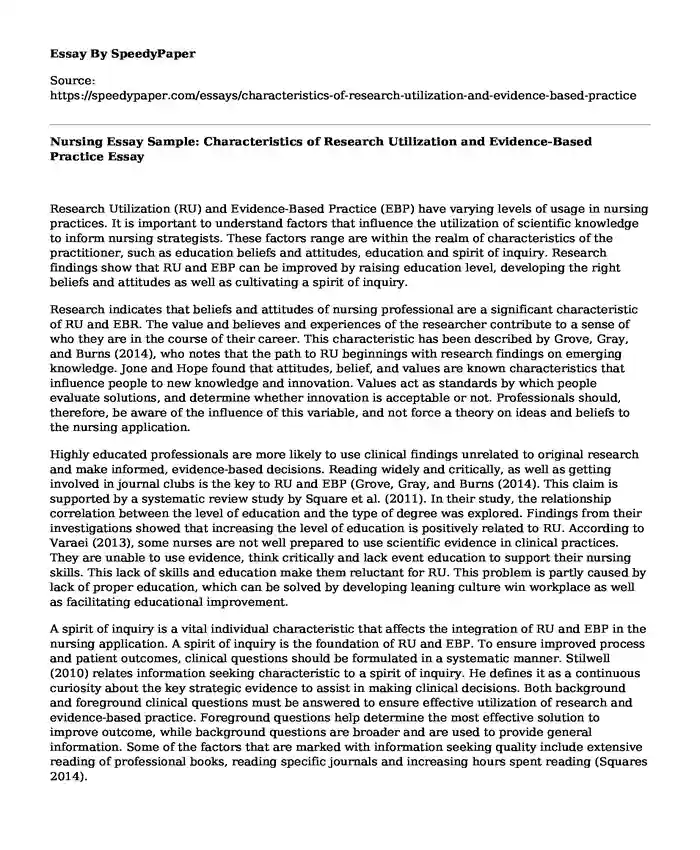Research Utilization (RU) and Evidence-Based Practice (EBP) have varying levels of usage in nursing practices. It is important to understand factors that influence the utilization of scientific knowledge to inform nursing strategists. These factors range are within the realm of characteristics of the practitioner, such as education beliefs and attitudes, education and spirit of inquiry. Research findings show that RU and EBP can be improved by raising education level, developing the right beliefs and attitudes as well as cultivating a spirit of inquiry.
Research indicates that beliefs and attitudes of nursing professional are a significant characteristic of RU and EBR. The value and believes and experiences of the researcher contribute to a sense of who they are in the course of their career. This characteristic has been described by Grove, Gray, and Burns (2014), who notes that the path to RU beginnings with research findings on emerging knowledge. Jone and Hope found that attitudes, belief, and values are known characteristics that influence people to new knowledge and innovation. Values act as standards by which people evaluate solutions, and determine whether innovation is acceptable or not. Professionals should, therefore, be aware of the influence of this variable, and not force a theory on ideas and beliefs to the nursing application.
Highly educated professionals are more likely to use clinical findings unrelated to original research and make informed, evidence-based decisions. Reading widely and critically, as well as getting involved in journal clubs is the key to RU and EBP (Grove, Gray, and Burns (2014). This claim is supported by a systematic review study by Square et al. (2011). In their study, the relationship correlation between the level of education and the type of degree was explored. Findings from their investigations showed that increasing the level of education is positively related to RU. According to Varaei (2013), some nurses are not well prepared to use scientific evidence in clinical practices. They are unable to use evidence, think critically and lack event education to support their nursing skills. This lack of skills and education make them reluctant for RU. This problem is partly caused by lack of proper education, which can be solved by developing leaning culture win workplace as well as facilitating educational improvement.
A spirit of inquiry is a vital individual characteristic that affects the integration of RU and EBP in the nursing application. A spirit of inquiry is the foundation of RU and EBP. To ensure improved process and patient outcomes, clinical questions should be formulated in a systematic manner. Stilwell (2010) relates information seeking characteristic to a spirit of inquiry. He defines it as a continuous curiosity about the key strategic evidence to assist in making clinical decisions. Both background and foreground clinical questions must be answered to ensure effective utilization of research and evidence-based practice. Foreground questions help determine the most effective solution to improve outcome, while background questions are broader and are used to provide general information. Some of the factors that are marked with information seeking quality include extensive reading of professional books, reading specific journals and increasing hours spent reading (Squares 2014).
Findings by Square et al. (20110 showed that there exists a moderate to string positive correlation between conference and RU and EVR. To become proficient in RU and EVR, nursing professionals are urged by Grave, Grey, and Jones (2014) to not only become involved in journal clubs but also pursue and take part in projects related to RU and EBP. One of the attributes of information seeking is reviewing information from numerous sources as well taking part in meaningful, quality driven pursuit.
Beliefs, attitudes, education, and spirit of inquiry are the critical characteristics of Research utilization and evidence-based practice. Research indicates that a positive correlation exists between these two variables and RU and EBR. Nursing professionals; should, therefore, develop the right beliefs when utilization scientific knowledge. They should also develop a critical approach to knowledge by increasing education level, as well as poses a spirit of inquiry.
References
Barta, K. M. (1995). Information-seeking, research utilization, and barriers to research utilization of pediatric nurse educators. Journal of Professional Nursing, 11(1), 49-57.
Errington, E. (2004). The impact of teacher beliefs on flexible learning innovation: some practices and possibilities for academic developers. Innovations in education and teaching international, 41(1), 39-47.
Grove, S. K., Burns, N., & Gray, J. (2014). Understanding nursing research: Building an evidence-based practice. Elsevier Health Sciences.
Hope, A. L., & Jones, C. R. (2014). The impact of religious faith on attitudes to environmental issues and Carbon Capture and Storage (CCS) technologies: A mixed methods study. Technology in Society, 38, 48-59.
Squires, J. E., Estabrooks, C. A., Gustavsson, P., & Wallin, L. (2011). Individual determinants of research utilization by nurses: a systematic review update. Implementation Science, 6(1), 1.
Stillwell, S. B., Fineout-Overholt, E., Melnyk, B. M., & Williamson, K. M. (2010). Evidence-based practice, step by step: asking the clinical question: a key step in evidence-based practice. AJN The American Journal of Nursing, 110(3), 58-61.
Varaei, S., Salsali, M., Cheraghi, M. A., Tehrani, M. R. M., & Heshmat, R. (2013). Education and implementing evidence-based nursing practice for diabetic patients. Iranian journal of nursing and midwifery research, 18(3), 251.
Cite this page
Nursing Essay Sample: Characteristics of Research Utilization and Evidence-Based Practice. (2022, Mar 31). Retrieved from https://speedypaper.com/essays/characteristics-of-research-utilization-and-evidence-based-practice
Request Removal
If you are the original author of this essay and no longer wish to have it published on the SpeedyPaper website, please click below to request its removal:
- Free Essay with a Letter of Application Example
- Free Essay: Preventive, Detective, and Corrective Controls at Walmart
- Ethics Audit Analysis of Microsoft Corporation, Essay Example
- History Essay Example on the Battle of Iwo Jima
- Organization and Attributes
- Pro and Cons of Online Education
- August Wilson the Playwright
Popular categories





